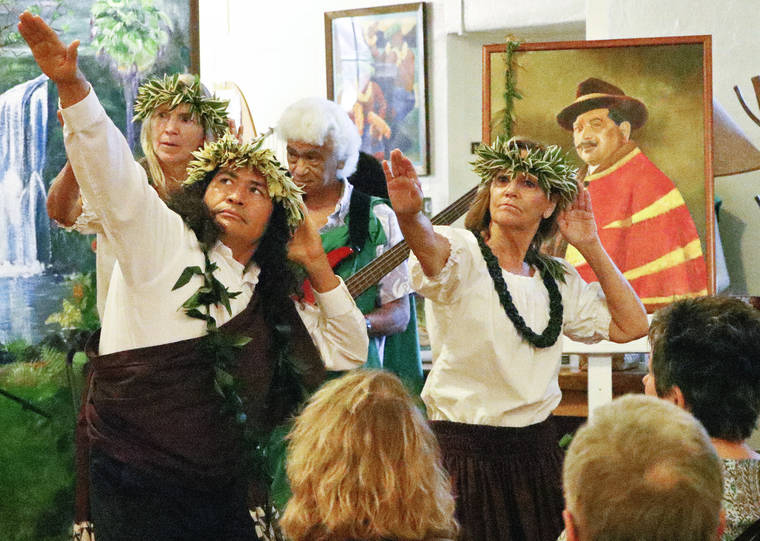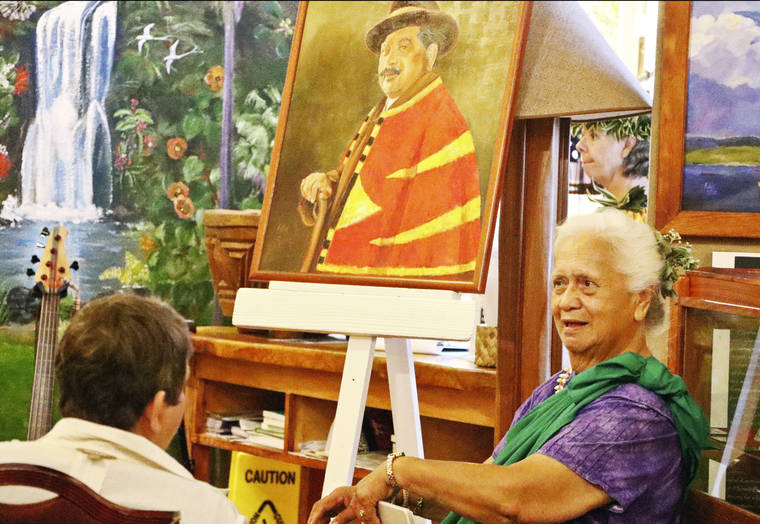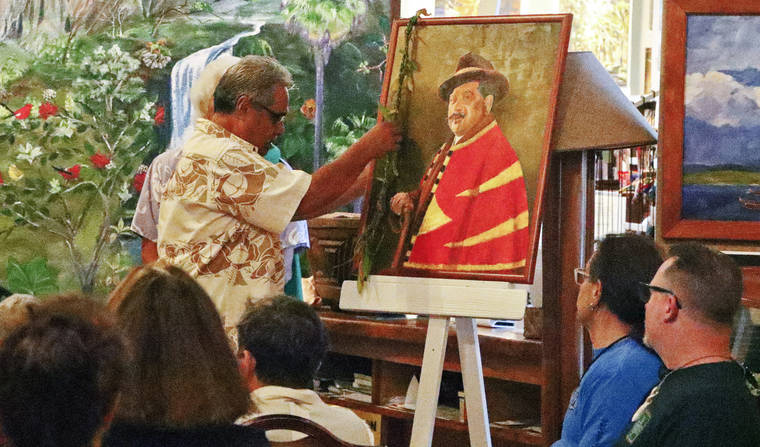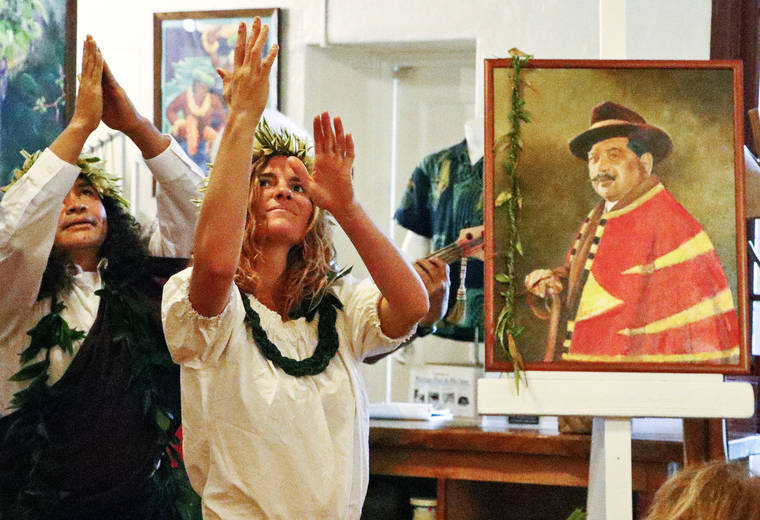Thomas Nizo helped Chad Pharis dig out whatever seating was available Saturday as people filled the main exhibit area of the Kaua‘i Museum.
And yet there were people standing in the overflow crowd during the tribute ceremony celebrating Prince Jonah Kuhio Kalaniana‘ole.
The ceremony marks the first of a month-long calendar of tributes and celebrations for the prince who was born on March 26, 1871, in the ancient fishing village of Hoai, Kualu, an area close to Kukui‘ula and marked by the Prince Kuhio Park that is currently maintained by the Royal Order of Kamehameha, Kaumuali‘i Chapter No. 3.
Saturday’s tribute, coordinated with the ‘Ahahui Kiwika Hawai‘i o Mo‘ikeha Hawaiian Civic Club, featured kupuna Ihi Kaneali‘i telling the Prince Kuhio story in a manner unique to kupuna storytelling, backed by the talent of Halau Hula o Hanalei performers with kumu Naomi Yokotake and her ‘ohana taking the words and mixing them effectively with mele and hula.
The combination was most effective in triggering the numerous smartphones into action, as familiar mele took root with Kaneali‘i’s story, an example being “Kaulana Na Pua,” a Hawaiian patriotic song written by Queen Lili‘uokalani’s friend Eleanor Kekoaohiwaikalani Wright Pendergast for the Royal Hawaiian Band that protested the overthrow of the queen and the Hawaiian kingdom.
“The people liked the tune, and did not realize that it was a protest against the government,” Kaneali‘i said.
The combination continued to speak of Kuhio’s legacy, namely Kuhio’s efforts at the formation of the Hawaiian Civic Clubs that include the ‘Ahahui Kiwika Hawai‘i o Mo‘ikeha Hawaiian Civic Club among its roster of more than 60 clubs across the country today.
The presentation also included information on the Hawaiian Homes Commission Act in 1921 that was another of Kuhio’s contribution to the welfare of the Hawaiian people. The Hawaiian Homes Commission Act gave birth to the state Department of Hawaiian Homes Lands, of which Anahola became the first project to be developed under the program.
The Kaua‘i Museum’s presentation will also travel to the Princeville Public Library on Wednesday, March 18, starting at 5 p.m., and The Cliffs at Hanalei on Monday, March 23, starting at 4 p.m.
The ‘Ahahui Kiwila o Mo‘ikeha group will also open the Friday, March 20 Prince Kuhio Festival at the Grand Hyatt Kaua‘i Resort &Spa in Po‘ipu, following the opening protocol at 9 a.m.
The day is filled with a silent auction, craft fair and hands-on learning of the Hawaiian culture and arts.
Vanya Fagasa will be working with ho‘oulana i ka lau hala, or hala weaving, Janet Kahalekomo and her ‘ohana will be working with ka lau niu, or coconut-frond weaving, kalo pounding, and pa‘akai, or the Hawaiian way of saltmaking.
Kupuna from Alu Like will work with the crowd to create and sew complimentary lei, and Maureen Fodale will work with feathers to create a simple hulu pua to celebrate and honor Kaua‘i’s Prince Kuhio.
The entertainment lineup includes 17 West, and Kahalau Leoiki with Nicole Balbarino doing the hula.








Copy/paste the following line into your browser, or Google:
Prince Jonah Kuhio Kalanianaole — Just how princely was he?
Some ethnic Hawaiians revere Kuhio as a prince for the same reasons the peasantry in any monarchial nation reveres its royalty — majesty, mystery, pride in the nobility of a great leader, and hope for handouts to help the poor and downtrodden. Wealthy racial separatist Hawaiian government institutions honor Kuhio as their founding father, the man who bowed low enough to the colonizers to bring home the bacon from their far-away seat of power. Yes, as Territory of Hawaii Delegate to Congress, Kuhio pushed through Congress the Hawaii Homes Commission Act of 1920 — the first of hundreds of racial entitlement programs. So ethnic Hawaiians dependent on government handouts absolutely adore him.
But was Kuhio’s personal behavior princely? At least two major events in Kuhio’s life after the revolution of 1893 should cause Hawaiian sovereignty activists to question his worthiness as their torch-bearer. On these two occasions Kuhio was grossly unpatriotic to his Hawaiian “nation.”
Kuhio was absent from his nation for many years on an adventure during the crucial period in the late 1890s leading to annexation. He went to South Africa to participate in the Boer War on the side of England. Let’s put that in different terms so that today’s sovereignty activists will get the point. Kuhio, designated heir to the throne, abandoned his native land during a time of great political upheaval and went to war halfway around the world, fighting on the side of one white colonial power against another white colonial power in a war to see which one would win control over the land of a poor, downtrodden dark-skinned native population.
But that’s not all.
15 years later Kuhio, a sitting Congressional delegate, abused his power and prestige to launch a personal attack against Queen Liliuokalani in order to steal her Waikiki land from the children she intended to help. In a 1915 lawsuit Kuhio publicly accused her of mental incompetence in order to nullify her creation of the Queen Liliuokalani Childrens’ Trust, and to establish himself as conservator of her estate, so that after her death her Waikiki properties would go to him instead of to the benefit of the Hawaiian children. Luckily for the children, his lawsuit failed. To read documents in the lawsuit, go to the webpage referenced at the top of this comment.